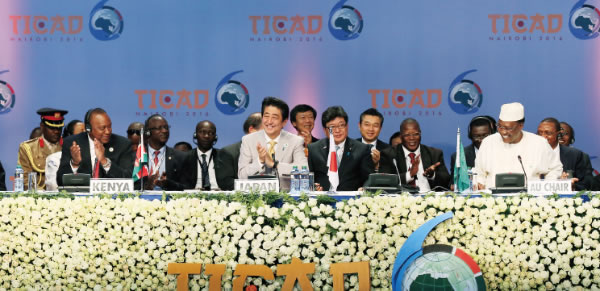Section 2 Development and the Reduction of Disparities and Poverty
The objective of the 2030 Agenda, which the G7 Ise-Shima Summit committed to implementing domestically and internationally, reflects the unwavering determination of the international community to eradicate poverty and achieve sustainable societies worldwide by 2030 and build a foundation for a more peaceful, stable, inclusive, and prosperous international community, leaving no one behind.
The reduction of disparities and poverty, in particular the eradication of absolute poverty in the world, is the most fundamental challenge in development, and it is essential to realize economic growth towards the selfreliant development of developing countries to address these issues. From this perspective, at the Sixth Tokyo International Conference on African Development (TICAD VI) held after the G7 Ise-Shima Summit in Nairobi, the capital of Kenya from August 27 to 28, 2016, participants emphasized that “quality growth” should be aimed for, in which the fruits of growth benefit the society at large, leaving no one behind.
In response to the request of Africa, TICAD VI was held in Africa for the first time in the more than 20- year history of TICAD. In TICAD VI, discussion was held among Japan, African countries, partner countries, international organizations, private sector participants, and members of civil society such as NGOs on three priority areas, “Promoting structural economic transformation through diversification and industrialization,” “Promoting resilient health systems for quality of life,” and “Promoting social stability for shared prosperity,” in order to respond to the various challenges that had emerged in Africa since TICAD V in 2013.
The Nairobi Declaration adopted as the outcome document of TICAD VI, and its appendix, the Nairobi Implementation Plan, reaffirmed the two principles characteristic of TICAD, African ownership and international partnership. They also reaffirmed the respect for human security, and effective implementation and follow-up mechanism and announced concrete initiatives in the above mentioned three priority areas, taking into account Africa’s own initiative for development and poverty reduction, Agenda 2063, (Note 1) and the international discussions such as SDGs.
At the Opening Session of TICAD IV, Prime Minister Abe announced that, for a period of three years from 2016 to 2018, Japan will invest approximately $30 billion under the public-private partnership (PPP) for the future of Africa through human resources development to 10 million people (“Empowerment”) by making use of the strength of Japan (“Quality”) and also by developing quality infrastructure, building health systems and laying the foundations for peace and stability, in accordance with the three priority areas of the Nairobi Declaration. These initiatives are the first step towards the realization of the outcomes of the G7 Ise-Shima Summit (related to quality infrastructure investment, health and women). In order to make the most of the excellent science, technologies and innovation of Japan and steadily achieve the outcomes, we will thoroughly implement the measures for the development of Africa announced at TICAD IV including through ministerial meetings in the TICAD process.

The closing session of TICAD VI held for two days starting from August 27, 2016 in Nairobi, Kenya. Prime Minister Shinzo Abe co-chaired with President Kenyatta of Kenya (host country), and President Deby Itno of Chad (AU Chair of 2016). (Photo: Cabinet Public Relations Office)
- Note 1: This is a charter established based on the Declaration of OAU/AU 50th Anniversary, for the integration and development of Africa over the next 50 years. It is the document that is the driving force for the continuation of Pan-Africanism aimed at the self-determination, growth, and freedom of Africa, and it was adopted at the Ordinary Assembly of the AU in January 2015.
